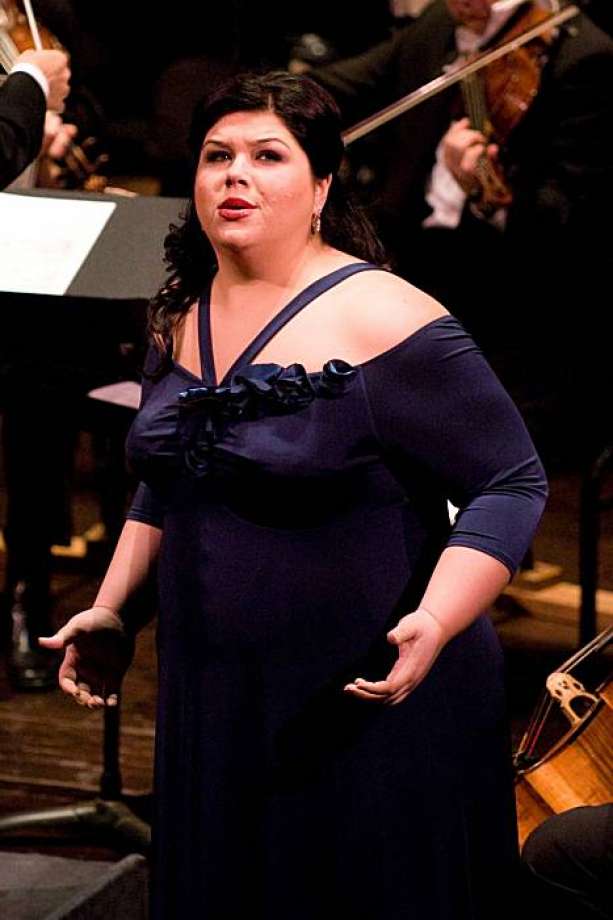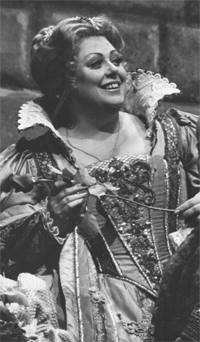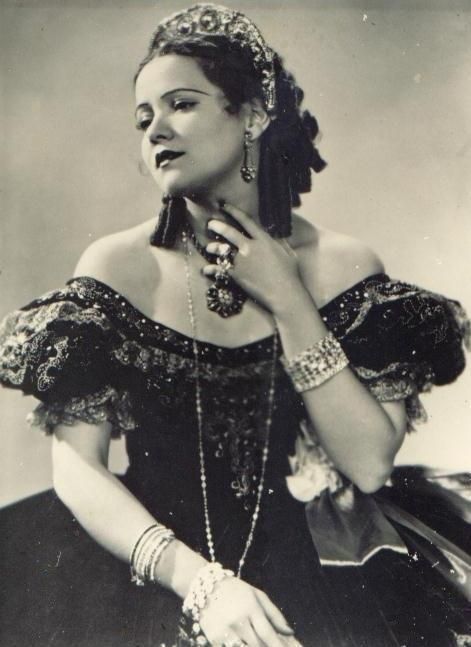|
SATURDEE OPRY LINKS 69: All
Kinds of Sopranos
  
Leah Crocetto
Margaret Price
Bidu Sayao
Saturdee Opry Links Overture!
"La Clemenza del Tito," by Mozart.
https://www.youtube.com/watch?v=zWH3G_wbhO0
1.
Lucia Popp started out with a coloratura---a light, elastic voice capable of
runs, trills and delicacies of Mozart and bel canto singing. The voice acquired
weight later, and she turned to heavier roles, even venturing into Wagner. In
the main, though, her singing was marked by beauty, warmth, and enormous skill,
and she is considered one of the "greats." Her Mozart is still revered. Here is
the exquisite, "Deh vieni non tardar," Susanna's aria from "The Marriage of
Figaro." "Oh, come, don't be late."
https://www.youtube.com/watch?v=R3NItbi7PDY
Role: Susanna, maid to the Countess of Almaviva, fiancee of Figaro
Setting: The garden of Count Almaviva
Synopsis: In order to tease Figaro, who thinks Susanna is cheating on him with
the Count, Susanna urges the Count to come quickly to her.
Translation:
http://www.aria-database.com/search.php?individualAria=220
About Ms. Popp:
https://en.wikipedia.org/wiki/Lucia_Popp
2.
Perhaps few come close to the control, specificity of tone, and great beauty of
the voice of the Spanish soprano, Montserrat Caballe. She had a long,
spectacular career that centered on bel canto, Puccini, Verdi. Still with us at
84 despite a recent tax evasion conviction (and suspended sentence.) There
really is no one like her; her voice is that identifiable. Here she is long ago
with the tender, poignant "Al Dolce Guidami," from Donizetti's "Anna Bolena."
https://www.youtube.com/watch?v=UgbU88Pyq6I
Here, the doomed Anne Boleyn longs to return to happier times.
Translation:
Italian:
Al dolce guidami castel natio,
ai verdi platani, al quello rio,
che i nostri mormora
sospiri ancor.
Ah! colà, dimentico
de' scorsi affanni,
un giorno rendimi
de' miei primi'anni,
un giorno sol del nostro amor....
Al dolce guidami castel natio,
un giorno rendimi
del nostro amor...
on giorno sol del nostro,
del nostro amor.
English:
Lead me to the dear castle
where I was born,
to the green plane trees,
to that brook that still
murmurs to our sighs...
Ah!
there I forget Past griefs;
give me back one day of my youth,
give me back one day of our love.
Lead me to the dear castle
where I was born;
give me back one day
of our love..
just one single day of our love.
SPOTLIGHT:
Caballe: Voice of Passionate Grandeur
http://www.npr.org/2011/03/09/134141700/montserrat-caball-a-voice-of-passionate-grandeur
3.
Is Anja Harteros the greatest soprano of our time? Judging by this clip, it's a
valid, if unprovable, contention. She is certainly the greatest soprano you most
likely have never heard of. Excerpt from a recent NYT piece:
"Her voice suddenly turns gray and hazy, without losing its steely core. Sinking
to its depths, its texture is like weathered velvet. She transforms before our
eyes from a cheerful girl into a woman who’s peered into the heart of grief. The
conductor Christian Thielemann put it simply: “The voice is one of the most
beautiful which has been ever around.”
Here she sings an arresting "Pace, Pace Mi Dio" from Verdi's "La Forza Del
Destino." Speaking of which, the reason that she is not claiming hers, at least
operatically, is nothing short of noble. She has placed the illness of her
husband ahead of career.
https://www.youtube.com/watch?v=hfW62QK7Jfk
Role: Leonora, the daughter of the Marquis of Calatrava
Setting: Outside the cave where Leonora has come to live out her remaining days
in repentance.
Synopsis: Leonora calls for peace from God on her tortued soul. She still loves
Alvaro after all these years and the bad things that have happened. She calls
upon God to end her suffering.
The translation is apt to her circumstance:
Peace, peace, my God!
Cruel misfortune, alas, forces me to languish;
my suffering has lasted for so many years,
deep as on the first day. . .
Full translation:
http://opera-cat.livejournal.com/18788.html
SPOTLIGHT: ANJA HARTEROS
What’s Keeping One Of Opera’s Great Sopranos From Singing?
https://www.nytimes.com/2017/07/04/arts/music/whats-keeping-anja-harteros-one-of-operas-greatest-sopranos-from-singing.html
4.
"For sheer loveliness of timbre, affecting sensitivity, elegance of line and
utter ease in florid passagework, she was hard to top. By the 1950's she was a
mainstay of opera houses around the world and widely admired for her portrayals
of leading lyric soprano roles, including Puccini's Mimi (from "La Bohème") and
Madama Butterfly, Verdi's Violetta (from "La Traviata"), and Massenet's Manon,
Bizet's Carmen and Debussy's Mélisande. Though her sound was not enormous, she
knew how to project her voice so that it carried effortlessly in the opera
house. She even sang lighter Wagner roles with effectiveness and allure."
This is Anthony Tommasini writing of Victoria de los Angeles in her NYT obituary
in 2005. In a way, he could be writing about any number of great sopranos, and
that's where the challenge of describing (and understanding) different voices,
vocal characteristics, comes into play. What makes a great soprano unique? What
sets her apart from others? In some cases, it's merely personal taste, I
suppose, and in others (Callas) it is an innate and sincere emoting, in part,
that is the distinction. She made landmark recordings of Puccini's "Boheme" and
"Tosca" with Bjorling in the '50's. Here she sings "Mi Chiamano Mimi" from "Boheme."
(Me? I like the way her voice lilts, and her no-frills/affectations delivery.)
"We are a people that sings naturally," she said in a 1980 interview, referring
to her nationality. "When we have a sorrow, it is a wonderful sorrow; when we
have a happiness, it is a wonderful happiness, it is a big happiness."
https://www.youtube.com/watch?v=b_0BxHG54ew
Role : Mimi, a seamstress
Setting : Christmas Eve in a room in an attic
Synopsis : After Rodolfo tells her that he has fallen in love with her, he asks
Mimi to tell him something of her. She responds, telling him (among other
things) that her name is Lucia, although she is called Mimi.
Translation:
http://www.aria-database.com/translations/boheme2_simi.txt
5.
Elizabeth Schwarzkopff was a Nazi, period, end of story. She was a teenager when
she joined, seeing the move as to her advantage, career-wise (it was), and she
later claimed variously that her father forced her to join and that she always
separated art and politics. I also find objectionable her cantankerous dismissal
of most other sopranos, late in her life. Yet there is the voice. From a column
by Martin Kettle in The Guardian:
"When she sang in Fidelio, recalled Kirsten Flagstad, “I thought I never heard a
lovelier sound coming from a human throat.” Sviatoslav Richter, who never
suffered fools gladly, said “Whenever this great artist sings, she is always at
her superlative best.” “Nothing failed,” wrote the Guardian’s Philip
Hope-Wallace of a late Schwarzkopf recital in St Pancras town hall in 1972."
Once again, human artistry has its beauty and integrity, no matter the beliefs
of the artist. Chopin was an anti-Semite. Should we therefore dismiss his
profoundly moving, rhapsodic, uniquely delicate work? I suppose it all comes
down to one's own priorities. I could not resist posting the sublime final trio
from R. Strauss's "Der Rosenkavalier," with Schwarzkopff, Sena Jurinac,
Anneliese Rothenberger from a 1962 film of the opera. With English captions.
https://www.youtube.com/watch?v=31CtNc0Zp2c
SPOTLIGHT:
Schwarzkopff: Does Art Excuse the Politics?
https://www.theguardian.com/music/musicblog/2015/dec/07/elisabeth-schwarzkopf-centenary-does-the-art-excuse-the-politics
6.
Rita Streich was born in Barnaul, southern Siberia, in the Russian part of what
was then the Soviet Union, to a German father who had been a prisoner of war
there, and a Russian mother. She moved to Germany with her parents during her
childhood. She grew up speaking both German and Russian fluently, something that
was extremely helpful during her later career. She became one of the most
significant sopranos of the post-war period, spending most of her career in
Europe. She had light, almost bird-chirp of a coloratura voice (listen to her
"Queen of the Night" aria from Mozart's "The Magic Flute") but was also capable
of subtly beguiling charm. How many times have you heard "O Mio Babbino Caro"
from Puccini's "Gianni Schicchi?" Probably so many that you don't ever care to
hear it again, I might guess. (I sometimes feel this way, thank you, car
commercials and so-called classical radio stations.) BUT. . .Watch Streich sing
it, and you'll find yourself fighting to not be moved. There is almost a
capriciousness about it, a disarming earnestness, of the type one might expect
from the teenaged girl character (Lauretta) she is portraying. It's all in the
voice.
https://www.youtube.com/watch?v=jT7WWseWmyU
About the aria, translation:
https://en.wikipedia.org/wiki/O_mio_babbino_caro
And here is more characteristic Streich with "Die Holle Racht," the Queen of the
Night Aria, from Mozart's "The Magic Flute," just for contrast:
https://www.youtube.com/watch?v=COAptyz_GRY
7.
The diminutive Brazilian soprano, Bidu Sayao, was restricted by her small voice
to the lyric and coloratura repertory. She often lamented that she could not
sing heavier roles such as Tosca and Butterfly (she performed excerpts on stage,
anyhow.) Still, her interpretations of Manon, Violetta in ''La Traviata,'' Mimi
in ''La Boheme'' and Susanna in ''Le Nozze di Figaro,'' among other roles,
received consistent praise, with critics stressing her expressiveness,
sensibility, girlishness and excellence of phrasing. Here, from "Manon," by
Massanet, is the gavotte,
"Obéissons quand leur voix appelle."
https://www.youtube.com/watch?v=i4LJIuNgjxg
Role: Manon Lescaut, a young woman, cousin of Lescaut
Setting: A busy square in Paris, France, 18th century
Synopsis: Manon appears in the crowd and tells her admirers about her philosophy
to live only for the moment, caring not what happens afterwards. After all,
there is little time in youth. One should spend it loving, singing, and dancing.
Translation:
http://www.beverlysillsonline.com/text/l_manon03.htm
8.
This soprano hits a note that would have shattered glass in a Three Stooges
Short. It comes very close to approximating the sound of a Theramin. You'll have
to find it yourself. This is the almost freakishly gifted French soprano, Mady
Mesple, still with us, singing the Bell Song ("Ou va la jeune Hindoue?") from
Delibes' "Lakme." From Wiki: "The archetype of the light French coloratura
soprano, Mady Mesplé was noted for her technical security, her musical
refinement and her charming stage presence. Her voice was particularly
recognisable for its quick vibrato, intensely focused intonation, the
instrumental-like quality of her runs and an amazing upper register extending
easily to high A-flat."
https://www.youtube.com/watch?v=FmSu-0zsWuA
Role: Lakmé, daughter of Nilakantha, a divine priestess
Setting: A public square in a town in India
Synopsis: Ordered by her father, Lakmé sings the legend of the pariah's
daughter. The girl was walking through the forest at night and comes upon a
stranger who has been set upon by wild animals. She rings a magic bell that is
on her wand and saves the man, who is actually Vishnu, the son of Brahma the
Creator. Vishnu takes her up to paradise for saving him.
Translation:
http://www.aria-database.com/search.php?individualAria=152
Ms. Mesple, not incidentally, has bravely devoted herself to campaigning against
the disease from which she suffers, Parkinson's:
http://operafresh.blogspot.com/2011/01/mady-mesple-living-with-parkinsons.html
9.
Okay, you have not heard of Leah Crocetto. She is not one of the "greats." She
has had quite a difficult, unsettled time of it, becoming an opera
singer---chiefly due to crippling stagefright. At 37, with her gift for both
power and lyricism (she is a lirico-spinto, a lyric soprano capable of big
notes) and should be a household (opera) name, but. . .she avoided auditioning
for conservatories when she should have. Fear factor. After studying voice
briefly at some nondescript Christian college, she dropped out and became a
waitress at the Olive Garden in Times Square. Yech! At night Ms. Crocetto
snagged jazz singing gigs in piano bars. At one point, in a fit of desperation,
she tried to salvage her would-be opera career by auditioning for the Met
chorus. She was rejected, not because she wasn't good enough, but because she
was far too good. The judges told her she was a soloist, and told her to
continue studying. But it was not to be. She abandoned everything to take care
of her dying father, who told her, "Go back to your voice teacher and figure
this thing out." And so she finally did, winding up at the San Francisco Opera's
Merola Program for understudies. (Her high C took the place of a resume.) Before
long, she was starring in "Aida" and as Liu in Puccini's "Turandot." Ms.
Crocetto made her Met debut in 2015 as Liu, and has gone on to other major
roles. She has the sad problem of weight that borders on obesity, and one hopes
that she gets it under control. As her father told her, "This is your
gift---this is what you're born to do." Here she is as "Liu" in "Turandot, with
"Tu, che di gel sei cinta" ("You who are encircled in ice.")
Role: Liú, a slave girl
Setting: The gardens before the walls of Peking
Synopsis: After being captured and tortured because she knows Calaf's name, Liú
is asked by Turandot why she resists the torture so well. She replies that her
love for the "Unknown Prince" keeps her from telling his name. She sings that
Turandot's icy heart will one day be melted by Calaf and that Turandot will love
him as Liú does now.
https://www.youtube.com/watch?v=TgjAYxirNBA
Translation:
http://operainenglish.blogspot.com/2011/11/tu-che-di-gel-sei-cinta-turandot.html
And here she is with "Un Bel Di" from Puccini's "Madama Butterfly."
https://www.youtube.com/watch?v=GVyNYnUqqvQ
About the aria, translation:
https://en.wikipedia.org/wiki/Un_bel_d%C3%AC_vedremo
FINAL BOW:
In today's “All Kinds of Sopranos” SOL, we turn at last to one Margaret Price.
The wonderful critic Tim Page said of her 1985 recital at Carnegie Hall, “Her
voice has both majesty and intimacy — an all but impossible combination — and
her artistry seems capable of illuminating every human truth.” Such are the
grasping statements prompted by the artistry of the human voice, eh? What do you
year in Ms. Price's rendering of the transcendent "Liebestod" from Wagner's
"Tristan und Isolde," also known as "Mild und Liese?" Is Page on target?
Ms.Price was born in Wales, and but for a music teacher interceding between her
and her father, would have become a biology teacher. (Superlatives for teachers
here.) She began as a mezzo, which you can still hear in the richness and
creaminess of her tone. Alas, she battled weight problems and died of heart
failure at 69 in 2011, her last years spent in retirement, raising golden
retrievers at her home on the Welsh coast.
https://www.youtube.com/watch?v=-wYzSx5QaiY
Role: Isolde, an Irish princess
Setting: Tristan's castle at Karoel, Brittany, legendary times
Synopsis: After Tristan has died, Isolde looks upon him in a trance. She
believes that she sees her beloved coming back to life as she hears a lovely
melody around her. The hallucinations become stronger and stronger until, at
last, she falls down dead next to Tristan.
Translation:
http://www.aria-database.com/search.php?individualAria=989
Margaret Price’s Obituary:
http://www.nytimes.com/2011/02/01/arts/music/01price.html
Saturdee Opry Links Encore!
Anna Netrebko goes nuts.
"My Lips' Fiery Kiss," by Franz Lehar.
With English subtitles.
https://www.youtube.com/watch?v=p_kaOYC_Fww
Translation:
http://www.lieder.net/lieder/get_text.html?TextId=27407
Back to Opera Links
Back to Home Page
|



